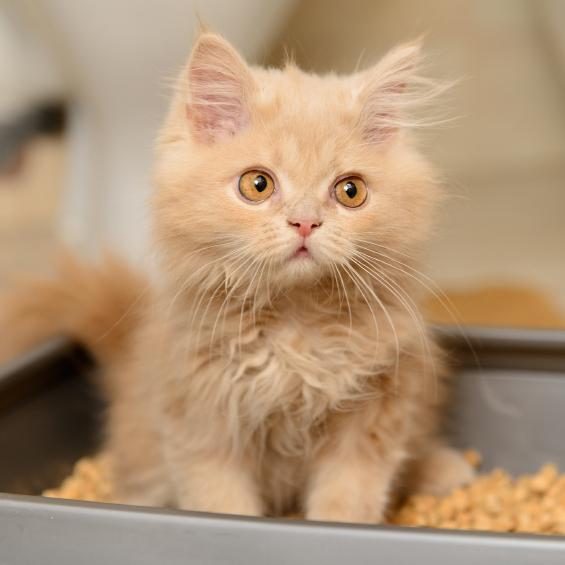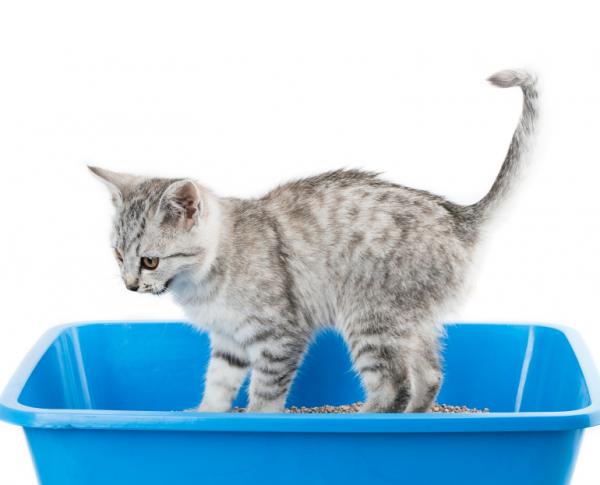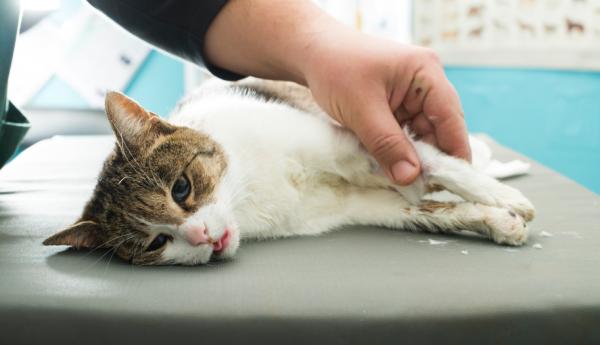My cat urinates blood – Causes

The presence of blood in the cat’s urine It is a symptom that usually frightens the owners, and most of the time with reason. Hematuria (as it is called in the medical language) is a symptom that can be related to many pathologies and that need an immediate assessment by the clinical veterinarian.
In order to inform you and alert you of what may be happening to your cat, in this article we will talk about the main Causes of blood in cat urine. Pay attention to the behavior of your furry companion and see if he has any other symptoms to offer the veterinarian all the possible details, since in many of the occasions explained below will be essential to identify the pathology in time to ensure the recovery of the cat.
What is hematuria?
As already indicated above, the presence of blood in the urine (of red blood cells) is referred to medically as hematuria. However, there are similar symptoms, such as the presence of hemoglobin in the urine, known as hemoglobinuria. Hemoglobin is the pigment that has the red blood cell inside it, so it has to break previously and in a massive way, and be filtered by the kidney to be eliminated through the urine. It is necessary to distinguish one from the other and this is done through a cat urinalysis that only the veterinarian can perform.
What can cause blood in the cat’s urine?
There are multiple pathologies that can manifest with hematuria and hemoglobinuria. However, whenever an attempt is made to reach a diagnosis, the most probable causes are usually considered first. However, it must be borne in mind that the most probable causes may vary with the cat’s age, diet and lifestyle habits.
The most likely causes of blood in the cat’s urine are usually:
- Trauma. It is frequent that the cat that has fallen from a considerable height, in addition to other injuries, may have had a small hemorrhage in the bladder of the urine, due to the impact.
- Infections. Cystitis in cats is common, as well as balanitis in males (infection in the penis). Due to the position of elimination of urine, ie peeing crouched, the ano-genital area can be stained and this is the route of penetration of different infections, thus producing the appearance of blood in the cat’s urine. In cats with long hair it is usually more common.
- Bladder stones. In the case of the cat, because it is an animal that usually drinks little water, if the food is not rich in water and slightly acidic, it can gradually form uroliths or urinary stones. These rub and erodes all the mucosa of the urinary tract, causing small hemorrhages that we can observe through the cat’s urine.
- En longhaired cats It is very important to watch that the hair does not become entangled around the penis of the males, since it could lead to infections and necrosis in the area.
- Different blood parasites. They are usually protozoa that are transmitted through fleas and ticks. When they massively destroy red blood cells, in addition to causing anemia, they can lead to hemoglobinuria.
- Bladder tumors. They are not too frequent in the cat, but they can occur. They usually occur in animals of advanced age and, due to the infiltration of the tumor tissue in the bladder wall, can lead to heavy bleeding.
- Viral diseases that occur with immunosuppression, such as feline immunodeficiency, etc. In animal it is usually less resistant to bacterial diseases, observing for example cystitis, which occur with hematuria.
- In the case of non-castrated females, the pyrometer It can occur with the expulsion of hemorrhagic-purulent material through the genital opening, being dragged by the urine.

Go to the vet
After seeing the main causes of blood in the cat’s urine, we can see how important it is to see a specialist. It will be the veterinarian, through the information provided by the owner, the exploration performed by the animal and other diagnostic means (analysis of urine and blood, as well as x-rays and ultrasound), which determines the disease suffered by the cat and choose the most appropriate treatment.
Remember that, as we commented at the beginning of the article, offering the cat the basic care it needs and providing it with adequate nutrition can help to avoid the appearance of the pathologies that cause hematuria. Likewise, and especially if the feline is of advanced age, it will be important to keep up with the vaccination and deworming calendar.

This article is merely informative, in .com we do not have the faculty to prescribe veterinary treatments or make any kind of diagnosis. We invite you to take your pet to the veterinarian in case of any type of condition or discomfort.
If you want to read more articles similar to My cat urinates blood – Causes, we recommend that you enter in our section of Other health problems.


